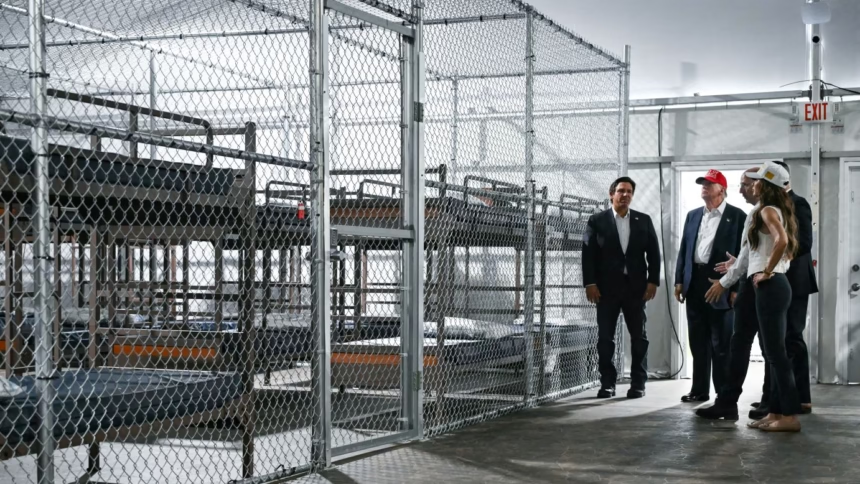The controversial migrant detention facility known as “Alligator Alcatraz” faces potential closure following recent legal developments.
A federal judge in Miami delivered a ruling on Thursday that halts both construction and operations at the contested facility situated within the Everglades.
The preliminary injunction builds upon a temporary restraining order issued a fortnight ago. According to ABC News, this represents one of the most notable applications of environmental legislation to challenge the Trump administration’s immigration policies.
The judge contextualized her ruling within Florida’s historical environmental commitments, stating:
“Every Florida governor, every Florida senator, and countless local and national political figures, including presidents, have publicly pledged to restore, conserve, and protect the Everglades. This order does nothing more than enforce the basic requirements of legislation designed to keep those promises.”
The ruling emphasizes the stark contrast between longstanding promises to preserve the Everglades and the establishment of a large-scale detention complex within this unique natural habitat.
State officials in Florida promptly indicated their intention to challenge the decision. ABC News reported that an appeal notice has been submitted to the U.S. Court of Appeals for the Eleventh Circuit, demonstrating the state’s resolve to proceed despite the judicial suspension.
Environmental advocates who initiated the legal action celebrated the outcome as a significant achievement. “A historic win for the Everglades,” they proclaimed.
Eve Samples, executive director of Friends of the Everglades, shared her perspective:
“This brutal detention center was tearing a hole in the fabric of life that sustains our most iconic wetlands and an entire array of threatened species, from majestic Florida panthers to aging wood storks. The judge’s order came just in time to prevent everything from collapsing.”
The “Alligator Alcatraz” faces dual legal challenges. The primary issue, which prompted the recent injunction, addresses environmental impacts and alleged violations of federal conservation statutes. The secondary challenge concerns detainee rights, particularly regarding legal representation access. This latter case recently experienced a setback when, as ABC News reported, “A federal judge dismissed part of the legal access complaint after the Justice Department designated a nearby immigration court to handle cases for the facility.”
The facility has emerged as a contentious symbol of the conflict between immigration enforcement objectives and environmental preservation. While state authorities emphasize the urgent need for additional detention capacity amid increasing migration, environmental advocates maintain that protecting the already-stressed Everglades ecosystem must take priority.
Legal scholars observe that this case marks an innovative application of environmental regulations to challenge immigration facilities, potentially establishing a precedent for future conflicts between security measures and environmental protection.
Florida’s appeal signals the beginning of an extended legal contest. The Eleventh Circuit must now balance environmental imperatives against the state’s immigration enforcement goals.
Meanwhile, construction activities remain suspended. The facility cannot accept new detainees, and expansion plans are suspended pending final judicial determination.
The ramifications extend well beyond Florida’s borders. The case highlights inconsistencies in the current immigration policies under President Donald Trump’s administration, prompting broader discussions about how America reconciles national security concerns with environmental conservation.
The Everglades—an internationally recognized ecological treasure—now stands at this intersection. While advocacy groups view Judge Williams’ ruling as crucial protection for a delicate ecosystem, Florida officials consider it a significant impediment to their immigration enforcement efforts.







